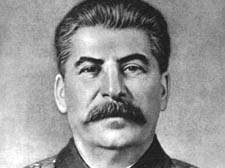|
|
 |
| |

Joseph Stalin: a new ‘hero’ |
Top of the tyrants: who’s the greatest dictator of them all?
A new world history of ruthless rulers who have abused their power comes at a time when ‘hero’ status is being conferred on one of the most notorious, writes Gerald Isaaman
The Tyrants: 2500 Years of Absolute Power and Corruption.
By Clive Foss. Quercus
JOE Stalin has been resurrected in Russia, where he just been voted the country’s third-greatest hero ever in a mass TV poll.
And in Austria, Adolf Hitler has become a newly elevated attraction in Linz, the 2009 European City of Culture, which Hitler planned to make one of his five model “Führer” cities.
History can easily be made to stand on its head and look foolish when the subject is so badly taught and the effect of 24-hour television from the cradle has virtually mesmerised, if not brainwashed generations to become total acolytes of fantasy and violence.
The dilemma must make life difficult for the publishers of this compelling survey of terrible tyrants, Stalin and Hitler notably among the 50 selected, from Xerxes, a Persian ruler before the birth of Christ, to Slobodan Milosevic in more recent times.
In The Tyrants: 2500 Years of Absolute Power and Corruption, Professor Clive Foss describes each of them – Genghis Khan, Nero, Napoleon, Franco, Peron, Idi Amin and Pol Pot to name but a handful – in all their ruthlessness, often in killing millions of their own subjects, manifested in their belief that whatever is done by supreme power is right.
Often too, he says, they were commoners or outcasts who were able to seize absolute power and leave mass suffering and destruction in their wake.
He reveals that the word “tyrant” was first used by a Greek poet in the 7th century BC to describe the enormously rich king of Lydia, the first foreign power to bring Greece under its control.
“The word he used probably came from the Lydian language,” he points out. “At that time, ‘tyrant’ was merely descriptive, without any negative connotation.
“But as Greece fell under the rule of a series of powerful men, the word came to mean something like the modern ‘dictator’ – a ruler who breaks the rules and goes beyond the limits imposed by laws and tradition to take arbitrary power.”
It is a telling and ironic recognition when you consider Greece was the birthplace of democracy, and the more so when Stalin was known as our friend Uncle Joe during the Second World War, despite his initial pact with Hitler to do down the West.
It is fascinating to consider the role religion has played in the backgrounds of these dictators. Josif Visarionovic Djugashvili, otherwise known as Stalin, the son of a drunken cobbler, was raised by his devout mother and a priest in poverty-stricken Georgia.
He was sent to church school, graduated to the Orthodox Seminary to prepare him for the priesthood but became instead a disciple of Karl Marx rather than God.
And there is no doubt that his reign produced positive results, transforming Russia’s peasants into a mechanised world power, one that might have proved much more benevolent had not Lenin died from a stroke in 1922.
That possibly provoked the recent Russian TV vote in Stalin’s favour, ignoring, as it blatantly does, the five million peasants who perished in the man-made famine of 1932-33 and the slave labour concentration camps Stalin created for dissidents, the death penalty too.
Terror began again in 1949 with his move against Jews in the Communist Party, Stalin’s paranoia of being poisoned such that he had the Kremlin’s doctors arrested, then believed to be the first step in eliminating the Soviet Union’s Jews altogether, à la Adolf Hitler.
Tyrants have huge egos, Professor Foss decrees, a few even believing they were gods.
Caligula demanded worship, Bokassa claimed he was the Thirteenth Apostle, Cromwell, Franco, Pinochet and Khomeini even convinced themselves they had God on their side.
Stalin, Mao and Kim Il Sung built extravagant personality cults that raised them to a superhuman status, while Trujillo, Bokassa and Saddam Hussein encouraged something similar. Caesar and Cesare Borgia were fearless.
However, the Ottoman sultan Abdul Hamid, known as “The Great Assassin”, cowered in his palace frightened of almost everyone.
Thankfully, many of the chosen 50 monsters came to a violent end. Seven were assassinated, three executed and two committed suicide. Three were killed in battle and eight others died after losing power, one of them in prison.
Must be time to turn off the telly for a truly ravishing read.
• |
| |
|
 |
 |
|
 |
|


